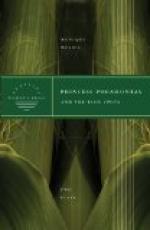“I will not be his squaw. Go thou thyself if he pleaseth thee so,” and Pocahontas would not stir from her tent that evening, though the gentle piping continued until the moon rose.
Yet Claw-of-the-Eagle did not despair. Not only had he won fame as a fighter but as a successful hunter as well. Never did he come back to Wansutis’s lodge empty-handed. Though the deer he pursued be never so swift, or the quail never so wary, he always tracked down his quarry. And he meant to succeed in his wooing.
So even when Pocahontas left Werowocomoco to visit her kinsfolk, the Patowomekes, he bided his time and spent his days building a new lodge nearby that of Wansutis, that it might be in readiness for the day when he should bring his squaw to light their first fire beneath the opening under the sky.
Meanwhile affairs in Jamestown had been going from bad to worse. Famine had become an almost permanent visitor there. Sir Thomas Gale had not yet arrived from England and no one was there to govern the Colony with the firm hand of John Smith. At length, however, it was decided in the Council that Captain Argall should set forth towards the Patowomekes tribe and bargain with them for grain.
Japezaws, the chief, received him in a friendly manner.
“Yes, we will sell to thee corn as I sold it to thy great Captain when he first came among us. What news hast thou of him? Will he come again to us? He was a great brave.”
Captain Argall answered:
“We have no word from him. Perchance he hath succumbed of his wound;” and then, because he was jealous of Smith’s fame among the savages, he added, “England hath so many great braves that we waste little thought on those that are gone. Jamestown hath all but forgot him already.”
“There is one amongst us who forgets him not,” Japezaws pointed to the valley behind him, “one there is who hath him and his deeds ever on the tongue.”
“Who may that be?” asked the Englishman, wondering if the Indian village held captive some countryman of his own long since thought dead.
“It is Pocahontas, his friend, who looks eagerly every moon for his return. She abideth gladly amongst us, for she groweth restless as a young brave, and Werowocomoco hems her in.”
Even while Japezaws was speaking a thought flashed through Argall’s brain; and while the slaves at Japezaws’s command poured forth measure after measure of corn and dried meat, the Englishman was adding to his first vague idea, until when the great load of yellow grain lay heaped before him, his plan was fully laid.
“I wish, Japezaws,” he began, as if the idea had just struck him, “that Powhatan, her father, had as great a love for Jamestown as his daughter. He will not even sell to us provisions now, though his storehouse is full to o’erflowing. If we could but make him see that, his gains would be greater than ours. ’Tis a matter of but a few more harvests before we have food and to spare, but where shall he find such copper kettles, such mirrors, such knives of bright steel as we would pay him in exchange for that he hath no need of?”




